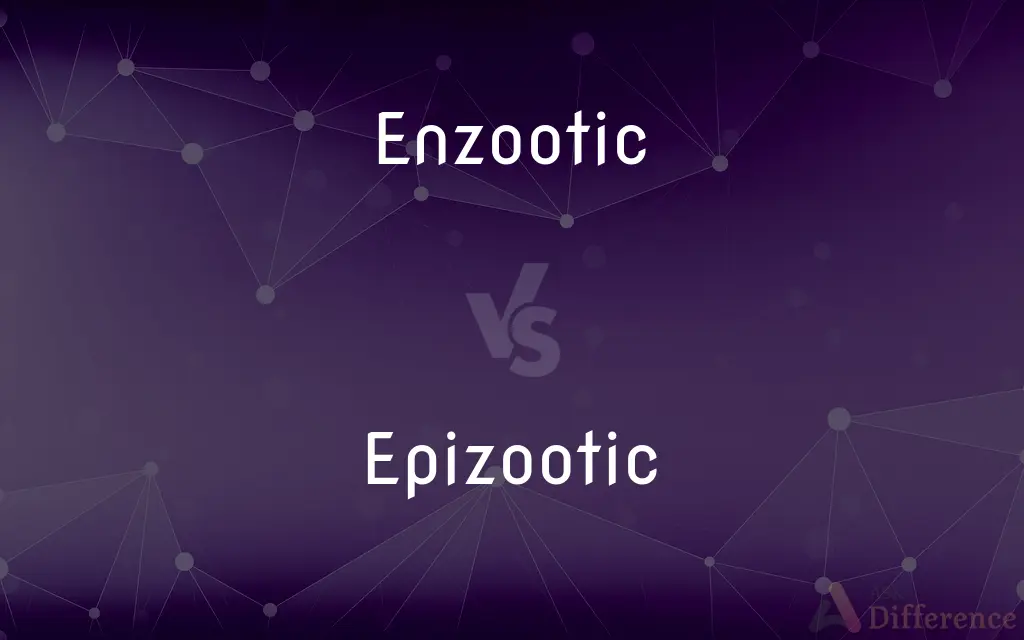Enzootic vs. Epizootic — What's the Difference?
By Fiza Rafique & Maham Liaqat — Updated on March 18, 2024
Enzootic refers to diseases regularly found among particular animal populations, while epizootic describes widespread disease outbreaks in animals.

Difference Between Enzootic and Epizootic
Table of Contents
ADVERTISEMENT
Key Differences
Enzootic diseases are those that maintain a constant presence within a specific animal population or area, indicating a stable, expected level of prevalence. Conversely, epizootic diseases are marked by their sudden, widespread occurrence, often spreading rapidly and affecting a large number of animals within a population or geographic area.
While enzootic conditions are akin to the concept of endemic diseases in human populations, suggesting a predictable and manageable level of disease, epizootics resemble epidemics, posing significant challenges to public and animal health due to their unpredictable nature and potential for rapid spread. This distinction highlights the difference in management strategies required for each, with enzootic diseases often managed through regular health monitoring and vaccinations, whereas epizootics may require emergency responses.
The occurrence of enzootic diseases is influenced by factors such as local environmental conditions, host immunity, and the presence of carriers or vectors, maintaining a relatively steady state of infection. On the other hand, epizootic outbreaks can be triggered by changes in ecological balance, introduction of new pathogens, or alterations in host-pathogen dynamics, leading to sudden increases in disease incidence.
Monitoring and controlling enzootic diseases are crucial for maintaining animal health and preventing the potential transition to epizootic states, especially in regions with dense animal populations or where animals and humans live in close proximity. Conversely, managing epizootic outbreaks often involves more drastic measures, such as quarantine, mass vaccination campaigns, or culling of affected animals, to prevent further spread.
Both enzootic and epizootic diseases have implications for wildlife conservation, livestock management, and public health, underscoring the importance of veterinary science and epidemiology in detecting, understanding, and combating these diseases. Understanding the dynamics between enzootic stability and epizootic potential is key to predicting disease outbreaks and implementing effective control strategies.
ADVERTISEMENT
Comparison Chart
Definition
Diseases regularly found among specific animal populations.
Widespread disease outbreaks among animals.
Prevalence
Constant and predictable.
Sudden and unpredictable.
Comparison to Human Diseases
Similar to endemic.
Similar to epidemic.
Management
Regular monitoring, vaccination.
Emergency response, quarantine, culling.
Trigger Factors
Stable environmental conditions, host immunity.
Changes in ecology, new pathogens.
Impact on Population
Generally manageable.
Potentially severe and rapid spread.
Importance
Long-term health monitoring.
Immediate disease control and prevention.
Compare with Definitions
Enzootic
Specific to particular locations or species.
Certain tick-borne diseases are enzootic to specific geographic areas.
Epizootic
Rapid spread of disease across animal populations.
The bird flu outbreak was an epizootic event.
Enzootic
Predictable occurrence based on environmental and host factors.
Enzootic pneumonia in pigs shows predictable seasonal patterns.
Epizootic
Significant mortality and morbidity rates.
Epizootic hemorrhagic disease causes high death rates in deer populations.
Enzootic
Constant level of disease within a population.
Rabies remains enzootic in certain wild animal populations.
Epizootic
Potential for cross-species transmission, including to humans.
Some epizootic diseases pose zoonotic risks to human populations.
Enzootic
Diseases that persist in a certain area or species.
Lyme disease is enzootic in some forested regions.
Epizootic
Can emerge suddenly and spread quickly.
An epizootic of foot-and-mouth disease can devastate livestock industries.
Enzootic
Emphasizes prevention and regular control measures.
Vaccination programs target enzootic diseases in livestock.
Epizootic
Often requires immediate and drastic actions.
Culling and quarantine are common responses to epizootic outbreaks.
Enzootic
Enzootic is the non-human equivalent of endemic and means, in a broad sense, "belonging to" or "native to", "characteristic of", or "prevalent in" a particular geography, race, field, area, or environment; native to an area or scope. It also has two specific meanings: an organism being "enzootic" means native to a place or a specific fauna in epizoology, an infection is said to be "enzootic" in a population when the infection is maintained in the population without the need for external inputs (cf.
Epizootic
In epizoology, an epizootic (from Greek: epi- upon + zoon animal) is a disease event in a nonhuman animal population analogous to an epidemic in humans. An epizootic may be restricted to a specific locale (an "outbreak"), general (an "epizootic"), or widespread ("panzootic").
Enzootic
Occurring at a steady or predictable rate in animals of a specific geographic area; endemic. Used of a disease.
Epizootic
Occurring at the same time among an unusually large number of animals in a particular geographic area. Used of a disease.
Enzootic
An enzootic disease.
Epizootic
An epizootic disease.
Enzootic
(epidemiology) a disease which is consistently prevalent in a population of non-human animals in a limited region, season or climate.
Epizootic
(epidemiology) An occurrence of a disease or disorder in a population of non-human animals at a frequency higher than that expected in a given time period. Compare epidemic.
At the same time as an epidemic of the flu broke out among the people, an epizootic of the swine flu broke out among their pigs.
Enzootic
Like or having to do with an enzootic
Epizootic
A particular epizootic disease.
Enzootic
Of a disease, prevalent in a given population or area
Rabies is enzootic throughout North America.
Epizootic
A disease or ailment (of humans).
Johnny's not doing so well today, I think he caught the epizootic.
Enzootic
Afflicting animals; - used of a disease affecting the animals of a district. It corresponds to an endemic disease among men.
Epizootic
(epidemiology) Like or having to do with an epizootic: epidemic among animals.
Epizootic plague occurred in the mice following introduction of rats from Europe.
Enzootic
Of a disease that is constantly present in an animal community but only occurs in a small number of cases
Epizootic
Containing fossils.
Epizootic
Relating to epizoa; epizoic.
Epizootic
Of or pertaining to an epizoön.
Epizootic
Containing fossil remains; - said of rocks, formations, mountains, and the like.
Epizoötic mountains are of secondary formation.
Epizootic
Of the nature of a disease which attacks many animals at the same time; - corresponding to epidemic diseases among men.
Epizootic
A disease attacking many animals at the same time; an epizootic disease.
Epizootic
A murrain; an epidemic influenza among horses.
Epizootic
(of animals) epidemic among animals of a single kind within a particular region;
An epizootic disease
Common Curiosities
Can enzootic diseases become epizootic?
Yes, under certain conditions, such as changes in environmental factors or host resistance, enzootic diseases can escalate to epizootic outbreaks.
How are enzootic diseases monitored?
Through regular surveillance, vaccination records, and studying environmental conditions that contribute to disease prevalence.
How does an epizootic differ from an epidemic?
An epizootic refers to outbreaks in animal populations, while an epidemic pertains to human populations.
What impact do epizootics have on the economy?
They can severely impact agriculture, livestock industries, and economies dependent on animal resources.
What is an enzootic disease?
An enzootic disease is one that is regularly found and maintained at a steady state within a specific animal population.
What role do vectors play in enzootic diseases?
Vectors such as ticks or mosquitoes can maintain and spread enzootic diseases among animal populations.
Why are epizootics concerning for public health?
Epizootics can have direct impacts on human health, especially if the diseases are zoonotic, capable of crossing from animals to humans.
Can climate change affect the status of enzootic diseases?
Yes, climate change can alter ecosystems and vector populations, potentially increasing the range and severity of enzootic diseases.
What is the significance of understanding enzootic cycles?
It helps in predicting disease outbreaks and implementing timely preventive measures.
How does wildlife trade impact epizootic diseases?
Wildlife trade can introduce novel pathogens to new areas, potentially triggering epizootic outbreaks.
What are common responses to an epizootic outbreak?
Responses include quarantine, mass vaccination, culling of affected animals, and public health advisories.
What measures can prevent the transition from enzootic to epizootic states?
Preventive vaccinations, wildlife management practices, and habitat modifications can help control disease spread.
Can human activities contribute to epizootic diseases?
Yes, through habitat destruction, climate change, and introducing non-native species, human activities can contribute to the spread of epizootic diseases.
How do enzootic diseases affect biodiversity?
They can impact species survival, especially if they affect endangered or keystone species.
Are all epizootics zoonotic?
Not all, but some epizootics are caused by zoonotic pathogens that can also infect humans.
Share Your Discovery

Previous Comparison
Complaint vs. Query
Next Comparison
Competition vs. BattleAuthor Spotlight
Written by
Fiza RafiqueFiza Rafique is a skilled content writer at AskDifference.com, where she meticulously refines and enhances written pieces. Drawing from her vast editorial expertise, Fiza ensures clarity, accuracy, and precision in every article. Passionate about language, she continually seeks to elevate the quality of content for readers worldwide.
Co-written by
Maham Liaqat














































